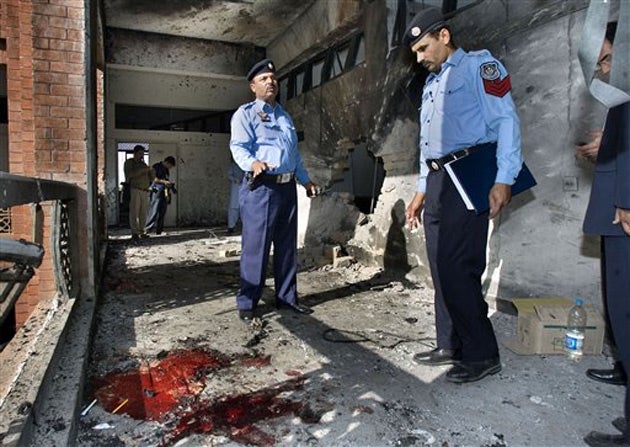Pakistan shuts schools after university bombing

Your support helps us to tell the story
From reproductive rights to climate change to Big Tech, The Independent is on the ground when the story is developing. Whether it's investigating the financials of Elon Musk's pro-Trump PAC or producing our latest documentary, 'The A Word', which shines a light on the American women fighting for reproductive rights, we know how important it is to parse out the facts from the messaging.
At such a critical moment in US history, we need reporters on the ground. Your donation allows us to keep sending journalists to speak to both sides of the story.
The Independent is trusted by Americans across the entire political spectrum. And unlike many other quality news outlets, we choose not to lock Americans out of our reporting and analysis with paywalls. We believe quality journalism should be available to everyone, paid for by those who can afford it.
Your support makes all the difference.Pakistan shuttered all educational institutions Wednesday after twin suicide bombings at a university, showing the power of militants to disrupt everyday life as they fight back against a major army offensive in the northwest.
Tuesday's attack occurred at the International Islamic University in Pakistan's capital, Islamabad, a target that surprised many in a country all too used to terror. Eight people died, including two women and the two attackers. All but one of the victims were students.
"Godless, kill in God's name," read the headline of The News daily.
Interior Ministry spokesman Rashid Mazari said schools and colleges would be closed until the end of the week so they could improve security measures.
The attacks, the latest in a surge in recent weeks across the country, occurred as troops pressed ahead with a five-day-old offensive in South Waziristan, a tribal region along the Afghan border that has long sheltered the Taliban and al-Qaida.
The army, which claims to have killed some 90 militants, said it was meeting tough resistance.
An Associated Press reporter met three Taliban fighters Tuesday traveling in a car with darkened windows at Shaktoi, a town close to the border between South and North Waziristan. They carried assault rifles, grenades and radios.
One of the men, who gave his name as Askari, said they had come from South Waziristan, where they and other fighters had pushed the army back from Kotkai, the birthplace of Pakistani Taliban leader Hakimullah Mehsud and a major strategic prize.
"We are inflicting heavy losses on them," he said.
Their account was consistent with one provided by two intelligence officials, who said the army was close to taking the town but was repelled. They asked that their names not be used for operational reasons.
It is nearly impossible to independently verify information coming from South Waziristan because the army has closed off all roads to the region. Analysts say both sides have exaggerated successes and downplayed loses in the past.
The university in Islamabad is attended by 18,000 students. It has close to 2,000 international students, many from China. While it is a seat of Islamic learning, most students take secular courses such as management science or computer studies.
Many students did not accept that militants were responsible for the attack and instead blamed shadowy forces out to discredit Islam or weaken Pakistan — variations of conspiracy theories that are often heard here after bombings.
"It shows clearly that anti-Islamic elements are involved in these attacks," economics student Abul Hassan said.
Join our commenting forum
Join thought-provoking conversations, follow other Independent readers and see their replies
Comments